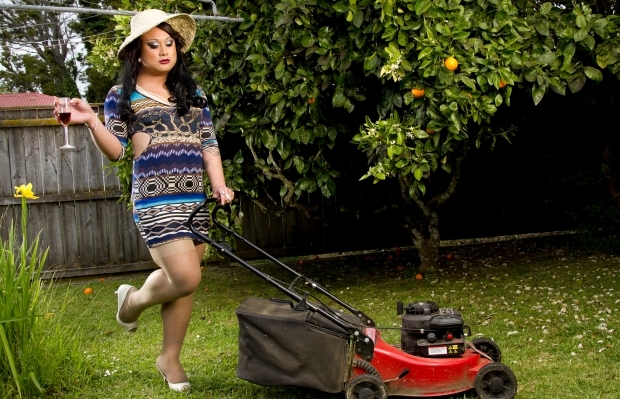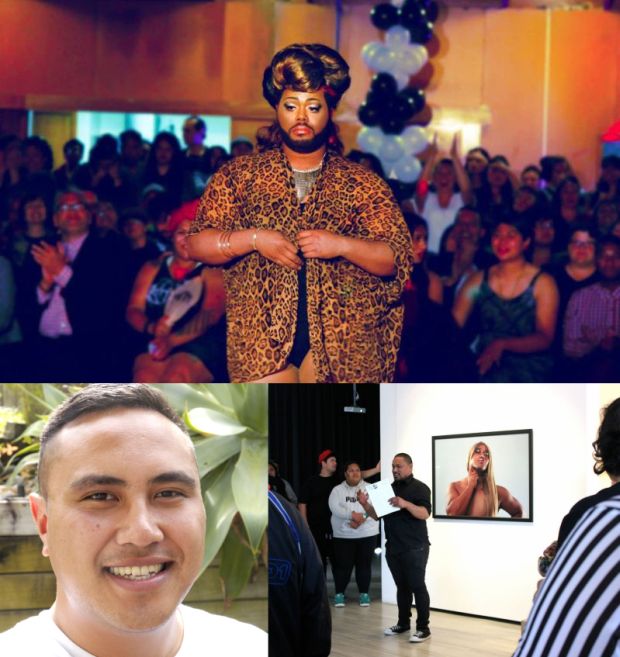
Visual artist Moe Laga plays with gender stereotypes as part of the Polytypical exhibition at Fresh Gallery Otara Image courtesy of Moe Laga
Pacific people are often portrayed in the media as homophobic Christians but the reality for some is quite different. A group of people in South Auckland believe religion and different types of sexuality can co-exist although perhaps not in the traditional sense.
Correspondent Daniela Maoate-Cox meets some outspoken members of our Pasifika communities to learn more.
Our young people are embedded in religious frameworks, it’s part of their culture and their identity and just because they identify this way doesn’t mean they’ve abandoned those values.” -Tanu Gago, Fafswag Ball organiser and Polytypical curator.
Tanu Gago looks on at the portrait of a woman in a mini dress, and high heels. A glass of wine is balanced in one hand while the other steers a lawnmower.
Her beard and Adam’s apple are expertly disguised with makeup.
“I just like the juxtaposition between the masculine expectation and the feminine delivery,” Tanu said. “It’s a little bit absurd, and a little bit ridiculous and very playful.”
The picture is part of a series displayed in an exhibition curated by Tanu called Polytypical. It features work from young Maori and Pasifika lesbian, gay, bisexual, queer, transgender and intersex, or LGBTQI, artists.
These are personal glimpses into people’s personal experiences and what I commend is their bravery to be able to share that collectively as a community .
The exhibition is just one platform organised by Tanu where the Pacific LGBTQI community can be themselves.
He also organised the Fafswag ball. A Polynesian take on the competitive ball culture from New York. People join a house to compete and use costume, dance and attitude to bend the binaries of gender in categories like realness female or male, butch queen, and drag diva.
There are a lot of siloed groups within the community who do their own thing and we were just trying to figure out a way to bring those people together.
Around the corner from the ball and the exhibition in South Auckland, is a Samoan Methodist church, but Tanu said he can’t imagine a situation where they would have a problem with each other.
“I love that the churches are around this space because that’s just real life,” he said. “Our young people are embedded in religious frameworks, it’s part of their culture and their identity and just because they identify this way doesn’t mean they’ve abandoned those values. It’s still very much a part of their life and I feel that’s reflected in the landscape, these two things coexist geographically the same way they do within our young people.”

Top: Fafswag ball contestant. image supplied, Bottom left: Tele'a Andrews once panicked that his sexuality couldn't coexist with his religion but says his faith pulled him through the shadows. Bottom right: Tanu Gago at the Polytypical exhibition
One of those young people is Tele’a Andrews. A self-proclaimed product of Catholic schooling in Wellington, Tele’a once thought he would become a minister. But at the age of 19 he moved to Auckland on a scholarship to study and once away from the distractions of family and religious obligations, Tele’a came out as gay.
It was actually quite a rude awakening to me and I got very panicked and worried about what that meant for the rest of my life. When I looked at my life and the idea that I was going to enter a religious life I thought "how could the two coexist?".
Tele’a was on the verge of giving up his faith but a chance meeting with a Father from his hometown changed his mind.
“He just told me a story about his cousin who came out as gay. He told me basically he still loves his cousin and his cousin is a huge part of his life and he said to me, which always lasted with me, that God calls everybody by name, and you can’t escape God’s call and whatever you do in life, you will be a minister to people. That’s why I’ve always believed in this walk, that my faith has pulled me out of the shadows.”
While church and faith go hand in hand a lot of the time Tele’a believes people can still be filled with the holy spirit without sitting in a pew every Sunday.
There are a lot of people out there with a deep-seated faith in God and what they’re called to do. They might not be at church every Sunday but they’re out there living church. They’re the people holding hope for people who find it difficult to hold it themselves and if that’s not the church made manifest then I’m not too sure what is.

